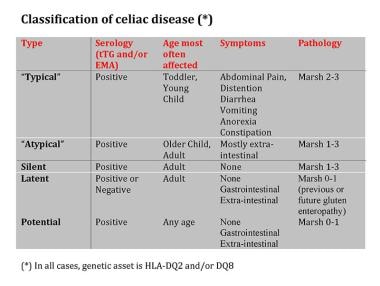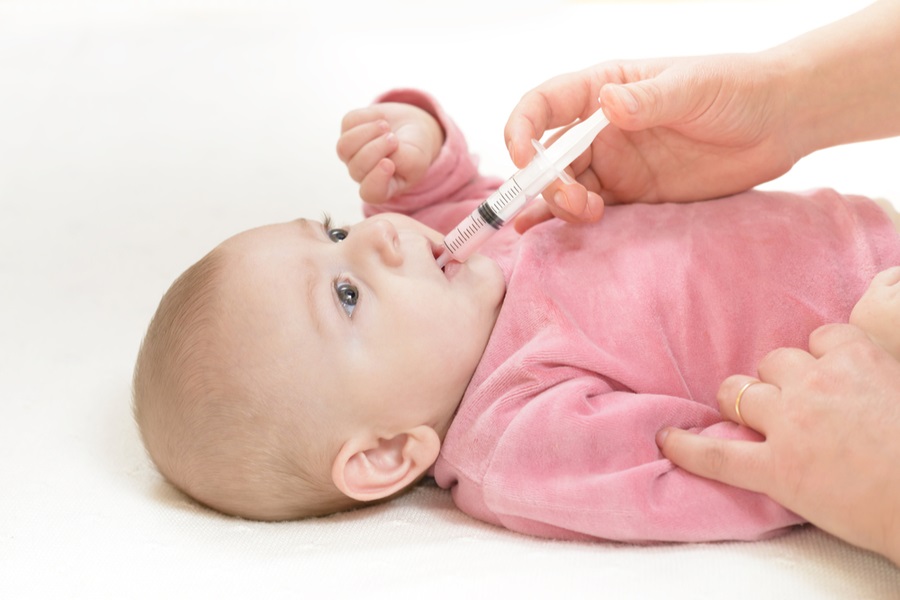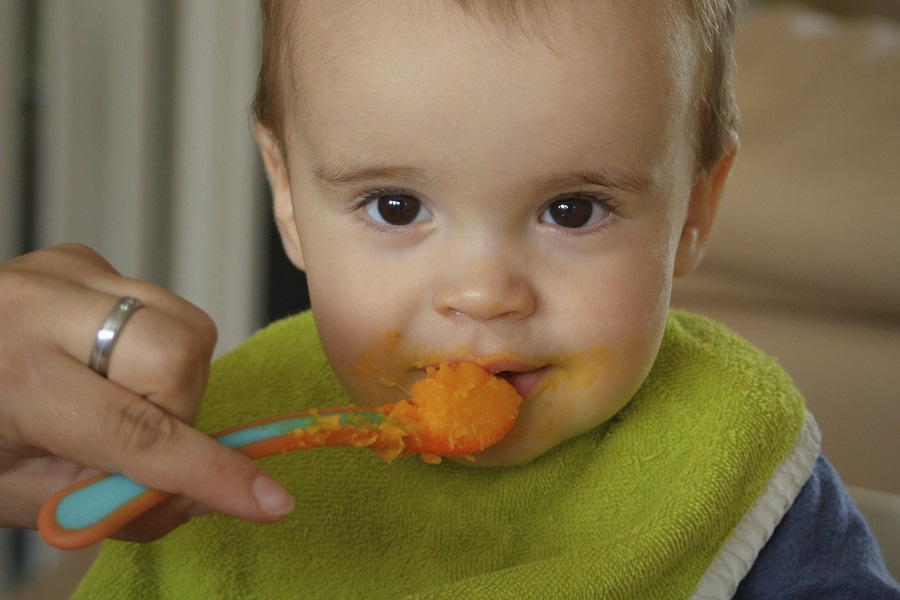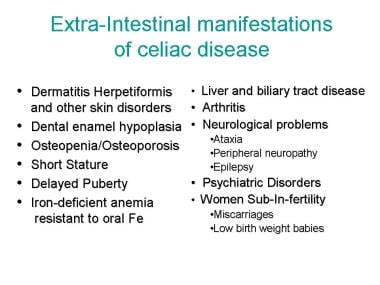celiac disease test in babies
If the Celiac Disease Test is Positive. Two types of testing are used to diagnose celiac disease.

Celiac Disease In Babies Good For You Gluten Free
The first is a blood test to measure whether there are antibodies immunoglobulins to injury caused by gluten are in the blood.

. How to Go About Testing My Baby for Celiac. To ensure an accurate result your child must eat at least some gluten in the weeks before the blood tests. If your childs blood test is negative for celiac disease markers.
Learn more about celiac disease testing here. Some children may not have symptoms and are only identified with the disease through a screening blood test. Standard tests include the following your physician will determine which tests are appropriate for your childs situation.
Signs of celiac disease in babies include vomiting diarrhea fatigue irritability and a failure to grow Guandalini says. Immunoglobulin A IgA and tissue transglutaminase IgA TTG-IgA. There is still a possibility that your child has celiac disease.
If your pediatrician agrees that celiac is a possibility she most likely will refer your child for blood tests that screen for celiac disease. On the basis of some research evidence and consensus guidelines recommend celiac testing in symptomatic children with typical and atypical symptoms and consideration of testing in those with associated conditions and first-degree relatives of those with celiac disease. In patients with suspected celiac disease measurement of serum IgA antibodies to tissue transglutaminase-2 has a high sensitivity and specificity and is the first screening test that should be ordered.
If celiac disease is suspected the person may then undergo a procedure called an upper. Upper Gastrointestinal Endoscopy Your childs doctor also performs an upper gastrointestinal endoscopy an outpatient procedure used to confirm a diagnosis of celiac disease. Celiac disease antibody tests find elevated antibody levels in over 95 of people who have the condition.
Blood tests for celiac disease measure two antibodies. Blood tests may also be used to look for antibodies that attack the thyroid which are common in children with autoimmune conditions such as celiac disease. Tests for these antibodies are most often used in people with low total IgA levels or in children.
But your child should have regular blood tests to see if they have blood markers signs in the blood for celiac disease. If this approach is being considered for your child it will be important. Based on the results of those blood.
Generally children at risk for celiac disease are screened at age 2 or 3 unless symptoms are seen beforehand. The blood test may also look for any genetic variations that are commonly associated with the disease. Diagnosing Celiac Disease in Infants and Toddlers.
In children younger than 3 with symptoms antibody testing may not always be accurate. Blood tests for celiac disease look for antibodies showing the immune systems response to. The ESPGHAN guidelines also recommend that the no-biopsy diagnosis can be offered to children without symptoms of coeliac disease asymptomatic children.
If your child is less than 3 years old you may be advised to see a gastroenterologist instead of relying on blood tests results. Celiac disease is an autoimmune enteropathy triggered by the ingestion of gluten in genetically susceptible individuals. These celiac disease blood tests cant actually diagnose the condition.
If your child is diagnosed with celiac disease Beyond Celiac will be with you every step of the way. Genetic testing is another way to rule out celiac disease and could be a good option for your child. It doesnt mean they will definitely have celiac disease and the chance of developing celiac disease is still low.
Gluten is a protein found in wheat rye barley and oats. Celiac Disease Testing in Children Under 3. It is very important to test your child at the very first signs or if celiac disease runs in.
Testing for Celiac Disease in Children Under the Age of 3. As a result a positive antibody test is usually required to. They only can tell whether or not its likely your baby has it.
Here are additional resources to guide. Serologic tests for celiac disease should be done in patients with unexplained chronic or intermittent diarrhea failure to thrive weight loss delayed puberty short stature amenorrhea iron deficiency anemia nausea vomiting chronic abdominal pain abdominal distension chronic constipation recurrent aphthous stomatitis and abnormal liver enzyme. If tests are positive an endoscopy is often done to check for intestinal damage.
Family member with celiac disease Type 1 diabetes Thyroid disease IgA deficiency Juvenile Chronic Arthritis Down syndrome Trisomy 21 Williams syndrome Turner syndrome. If the test results are positive for HLA DQ2 or DQ8 your child is at risk of developing celiac disease. From the University of Chicago Celiac Disease Center.
The test involves a panel of blood tests and it may be important to do additional testing for nutrient deficiencies especially iron. This explains why DR5DR7 individuals also have a predisposition to develop Celiac Disease and strongly indicates that it is DQ2 coded for by the DQA10501 and DQB102 genes that actually are involved in the development of Celiac Disease. Your child will need an endoscopy and more blood tests to figure out if heshe truly has celiac disease.
The first is to have an associated condition in which testing for celiac disease is recommended. Just like adults babies can develop celiac at any time and should be tested if exhibiting symptoms. A no-biopsy diagnosis can be made if children have very high antibody levels in their first blood test followed by a positive second antibody blood test.
About 95 of the Celiac population carry these particular genes. Initial screening consists of a blood test to screen for celiac disease antibodies. Anti-tissue transglutaminase tTG Anti-endomysium EMA Anti-deamidated gliadin peptides DGP.
Blood Tests for Celiac Disease. Blood tests are not always accurate in very young children. Blood tests can help diagnose and manage celiac disease.
Signs of celiac disease in babies include vomiting diarrhea fatigue irritability and a failure to grow guandalini says. It would typically take weeks or months to. An endoscopy is a test that checks the throat stomach and upper intestines for problems.
A person with celiac disease has higher than normal levels of these antibodies in their blood. If the test results are negative for HLA DQ2 or. High antibody levels are very uncommon in people who do not have celiac disease.
It is likely that the celiac disease tests could be inaccurate if the child is on a gluten-free diet The celiac disease testing process begins with a simple blood test. This is because the tests find antibodies that are only present in people with celiac.

Signs Your Child Has Celiac Disease Cleveland Clinic

Pediatric Celiac Disease Sprue Clinical Presentation History Physical Causes

Celiac Disease Wheat Allergy And Gluten Sensitivity In Children Babycenter Babycenter

Beyond Celiac My Daughter Kira Was Born Healthy But Shortly Before Her 2nd Birthday She Started Vomiting Occasionally Then At Her 2 Year Check Up We Learned She Had Only Gained

Coeliac Disease Gluten Allergies In Babies

Antibiotics In Babies First Year Might Increase Celiac Disease Risk Beyondceliac Org

New Guidelines For Feeding Infants At Risk For Celiac Disease Beyondceliac Org

Should You Screen Your Child For Celiac Disease The New York Times

Symptoms Of Celiac Disease In Babies Three Bakers

Pin By Elsa Gurton On Health Fitness Celiac Disease Symptoms Celiac Disease Awareness Celiac Disease

Celiac Disease In Children Or Teens The Sneaky Signs Allergic Living

Celiac Disease Pku Allergies Pediatrics Part B Ppt Download

Non Invasive Tests Now Thought To Accurately Diagnose Celiac Disease In Children

Six Reasons To Test For Celiac Disease Before Starting A Gluten Free Diet Amy Burkhart Md Rd

Pediatric Celiac Disease Sprue Clinical Presentation History Physical Causes
/GettyImages-1008809966-fa2a1e6c7e0a426d8f87f2024f75e76e.jpg)
Study Feeding Babies Gluten May Reduce Risk Of Celiac Disease

Tummy Trouble And Other Signs Of Celiac Disease In Infants And Toddlers Happy Gluten Free
